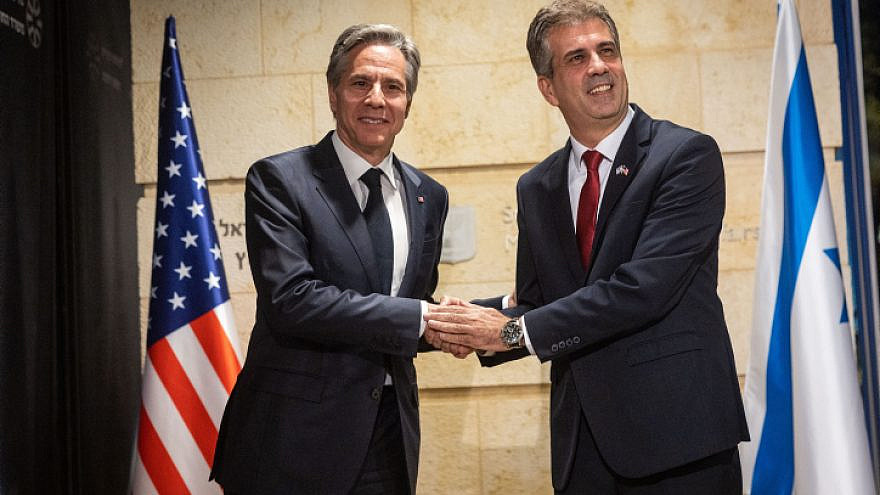Israeli Foreign Minister Eli Cohen on Tuesday called on Washington to take steps to convince Tehran that the United States is not bluffing when it comes to the possibility of the use of force.
“If the United States does not establish a credible military threat immediately, either Israel will attack, or Iran will have a nuclear weapon, which we will not allow under any circumstance,” the foreign minister said
The Iranian threat is two-fold, both as an aspiring nuclear power and as “the largest funder of global terrorism,” he said.
“Iran is Israel’s biggest challenge. They are constantly striving for a nuclear weapon…and they continuously endeavor to establish military threats against Israel, especially on our northern border, in the form of terror groups such as Hezbollah,” said Cohen.
The minister explained that the current government in Israel is willing to “use any means at its disposal to prevent Iran from getting nuclear weapons.”
He added, however, that a hard-line anti-Iranian policy from the United States might prevent the need for military escalation.
U.S. Ambassador to Israel Thomas Nides, speaking to the Conference of Presidents on Monday, said that “Israel can and should do whatever they need to deal with Iran.
“As President [Joe] Biden has said, we will not stand by and watch Iran get a nuclear weapon,” added Nides.
The Abraham Accords
Cohen continued his remarks by explaining the importance of the Abraham Accords in Israel’s strategy.
“These agreements increased stability in our region, they brought prosperity to our people, and most importantly they helped us to build a coalition against Iran,” he said. The minister said that he viewed a peace deal with Sudan as the next crucial step in developing the anti-Iranian alliance. Iran’s use of Sudan as a staging ground for shipments of weapons to terrorist groups in Judea and Samaria makes normalization with Khartoum a vital diplomatic goal, he explained.
The minister said the Foreign Ministry is fully dedicated to this task. “I believe we can have peace with Sudan in the near future. We are working very closely with our American friends to sign an agreement this year,” he added.
The global threat of Iran
Iran presents a universal rather than a regional threat, Cohen said. “If Iran will have nuclear weapons it’s not just a threat to Israel, it’s a threat to the entire world.”
Tehran’s growing relationship with Moscow has forced Israel’s European and U.S. allies to recognize the global nature of the Iranian threat, he said. “Iranian weapons are killing free citizens of Europe in Ukraine,” Cohen continued. “Now the Europeans see that the Iranian threat is coming closer to them.”
The minister explained that in his view, this new reality will force Israel’s European and American partners to adopt a more hostile approach to the Iranian regime.
Indeed, Nides, in his remarks on Monday said that while “the Iranians are providing drones to Russia … there is no chance of us going back to the negotiating table.”
Cohen further said that Iran’s new close ties with Russia have impeded Israel’s ability to effectively check the Islamic Republic’s aggression.
“Israel has been forced to face the partnership between Iran and Russia, which brings a lot of concern from our point of view,” said the minister, noting that Moscow is “a big player in our neighborhood” and that this reality restricts Israel’s ability to adequately check the growing Russo-Iranian axis.
This limitation underlines the importance of “the U.S. and Europe waking up to the Iranian threat,” Cohen said.


























